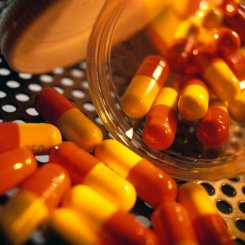 The drugs used to suppress the herpes virus appear to decrease the levels of HIV in the blood and rectal secretions, which may make sufferers less likely to transmit the virus. The results of the study, involving men with herpes simplex virus type 2 (HSV-2) and HIV, were published in the Journal of Infectious Diseases.
The drugs used to suppress the herpes virus appear to decrease the levels of HIV in the blood and rectal secretions, which may make sufferers less likely to transmit the virus. The results of the study, involving men with herpes simplex virus type 2 (HSV-2) and HIV, were published in the Journal of Infectious Diseases. The study noted that most HIV-infected persons are also infected with HSV-2, which is the major cause of genital herpes. Prior studies demonstrated that the risk of passing HIV to a sexual partner is greater when the HIV-infected person has genital ulcers caused by HSV.
The men in the study were randomly assigned to the anti-HSV drug valacyclovir or matching placebo for initial treatment.
After eight weeks, the researchers found significantly reduced levels of HIV in blood by about 50 percent and rectal secretions by about 30 percent during the 8 weeks when the HIV/HSV-2 co-infected men received valacyclovir to suppress reactivation of HSV.
The researchers say the study adds weight to the other evidence that HSV-2 reactivation increases HIV replication. According to the researchers, additional "ongoing randomized trials will answer whether HSV suppression can reduce HIV transmission and address the potential for HSV suppression to delay anti-HIV therapy [antiretroviral] initiation."
Related articles:
Herpes Turnaround Surprises Experts
Source: Infectious Diseases Society of America





